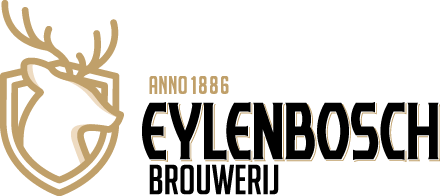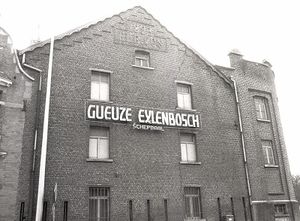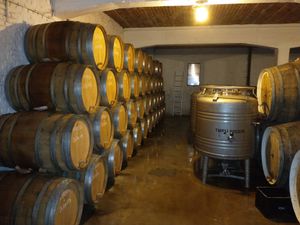Brouwerij Eylenbosch (Kobbegem)
Website (French, Dutch, English): https://eylenbosch.beer/
Contact: [1]
Address: Lierput 1 - 1730 Kobbegem Belgium
Phone: 32 476 80 04 38
Contents
Overview
Brouwerij Eylenbosch is a lambic brewery located in Kobbegem, Belgium whose lineages can be traced back to the former Brouwerij Eylenbosch in Schepdaal. It is currently brewing its own lambic at Brouwerij De Troch, where there is also a family connection to the brewery.
History
The official revival date of the Eylenbosch brewery is 1 February, 2018. By that point, owner Erik de Keersmaeker, and brewer Klaas Vanderpooten, a bioengineer by training, had partnered up to begin breathing new life into the old name.
The De Keersmaeker name is a familiar one in the lambic world, particularly in the town of Kobbegem. In 1869, Brasserie De Keersmaeker was established on an existing brewery site, operating since 1604. The original De Keersmaeker brewery was also known as "Den Hert", or "The Deer", a familiar symbol in the new Eylenbosch lineup. The family history in brewing is also surrounded by older acquisitions, mergers, and brands including Brasserie Brabux, including Vanderperre, Taymans, Ch. & R. De Keersmaecker, Belle Vue, and De Neve. During the interwar period and immediate postwar era, the De Keersmaeker name was known for brewing a variety of popular standard Belgian styles.
In the 1970’s, Erik’s father André De Keersmaeker, began working with Vossen family, including Albert Vossen, whose family owned the famous Belgian café A La Mort Subite and was blending their own lambic at the cafe at the time to begin producing lambic under the Mort Subite name as a separate brand. The success of the Mort Subite brand under the De Keersmaeker brewery also led to the family acquiring Brouwerij Eylenbosch in 1989, before the Alken-Maes group ultimately bought up all of the family’s shares in the lambic industry. Though the De Keersmaeker family had both the Eylenbosch as well as the Mort Subite names in their brand portfolio, Alken-Maes had no interest in buying two lambic brand names, and only chose Mort Subite. Erik De Keersmaeker maintained the Eylenbosch brand name and the historical brew site in Schepdaal.
The revived Eylenbosch in Kobbegem will not be using the iconic brewery building in Schepdaal, since it was recently remodeled into commercial housing, but there are plans to use a remaining 300 square meters of space for up to ten 45hl foeders. Well water from the original Eylenbosch source has also been secured for future brewing operations, further serving to reconnect the new Eylenbosch with its historical roots. In addition to storage at the former Eylenbosch site, barrels are also stored at De Troch, and on a farm in Zellik called “Hof van Piemont”. This 18th century farm is an organic fruit farm for over 75 years, and the farmer (who is a nephew of the De Keersmaeker family) mostly harvests apples and pears.
To help finance the revival of the iconic Eylenbosch brand, a crowdfunding project was launched from October 24, 2019 until May 31, 2020. Eylenbosch produced a non-lambic beer called ‘Patience for Eylenbosch’ prior to 2021. Participants of the crowdfunding received Eylenbosch beers and merchandising in return for their investment. The first lambic beers which were launched in January 2021 are Kriek and Geuze. Future brewing plans include other fruit lambics such as: Cassis, Peche, and Framboos. The Eylenbosch beers are sold exclusively in Delhaize supermarkets in Belgium.
Brewing and Blending Process
The first official brew date for the revived Eylenbosch was 1 April 2019 at De Troch. As of 2021, the brewery is housing approximately 270 barriques holding 225 liters each, with remaining space for around 30 more barriques (300 total). The recipe for Eylenbosch lambic is a standard lambic recipe that uses approximately 36% wheat and 64% barley, this is a different recipe than that of De Troch. After the brew, approximately 45 hectoliters of lambic is available after the coolship.
As of March 2021, Eylenbosch also has 17 foeders of 5,000 liters each at the farm in “Hof van Piemont” in Zellik. This means the total capacity of the brewery will be about 100,000 liters of lambic.




